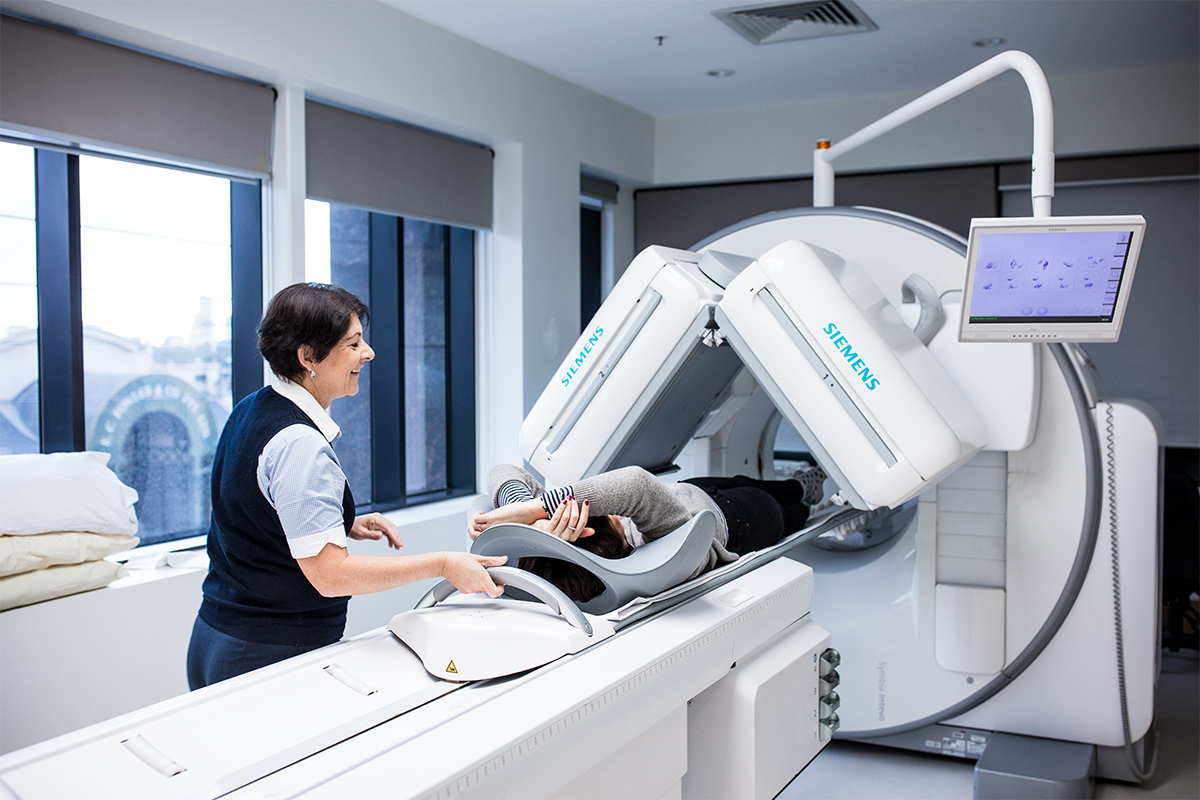Symptoms associated with pancreatic cancer often overlap with symptoms of other less serious stomach issues, such as reflux and irritable bowel syndrome. This is one of the main reasons why the disease is difficult to diagnose early.
Your general practitioner (GP) will see hundreds of patients each year with stomach issues. Of those patients, they’re only likely to diagnose 2-3 cases with pancreatic cancer. For this reason, your GP is unlikely to diagnose pancreatic cancer based on symptoms alone.
There is a combination of methods that can be used to determine if a person has pancreatic cancer. These include:
- symptoms
- risk factors
- imaging
- endoscopy
- laparoscopy.
Watch: How is pancreatic cancer diagnosed? | Patient education video
What tests are available to help determine a diagnosis?
There are different tests available to determine if you have pancreatic cancer. They include imaging, endoscopy and laparoscopy.
Imaging
Medical imaging uses x-rays, magnetic fields, sound waves, or radioactive substances to create pictures of the inside of your body. Imaging is non-invasive (taken from outside of the body), and doctors use it to:
- check suspicious areas to see if they’re cancerous
- learn how far the cancer may have spread
- help understand if treatment is working
- look for signs of cancer coming back after treatment.
Computerised tomography (CT) scan
A CT scan uses a series of X-ray images taken from different angles around your body. It builds a 3-D image of your pancreas and the organs around it. The scan can also identify if the cancer has spread to other organs and determine if surgery is a treatment option. CT scans can sometimes require the injections of a dye for better visualisation.
Positron emission tomography (PET) scan
A PET scan involves a dye injection into your body that contains radioactive tracers. A camera then takes pictures of the areas with radioactivity, as radioactivity can indicate the presence of tumours.
Magnetic Resonance Imaging (MRI) scan
MRI uses a magnetic field and radiofrequency waves to generate high-resolution, cross-sectional images of your pancreas and the organs close to it. Since MRI uses a strong magnet, metal on or inside the body can be affected and should be discussed with your doctor.
A magnetic resonance cholangiopancreatography (MRCP), is a different type of MRI used to look at the pancreas, liver, gallbladder and bile ducts.
Endoscopy
A gastroenterologist performs endoscopic procedures using an endoscope. An endoscope is a thin, flexible tube with a tiny camera attached to it.
- Endoscopic ultrasound (EUS)
An EUS test involves passing a small ultrasound probe on the tip of an endoscope through your mouth into your stomach. The endoscope allows your gastroenterologist to look inside your digestive tract. They can also take a biopsy sample if needed during this procedure. - Endoscopic retrograde cholangiopancreatography (ERCP)
An ERCP test involves passing an endoscope down your throat, through the oesophagus and stomach, into the first part of the small intestine. X-ray images are then taken of the bile and pancreatic duct to look for any blockages or narrowing of ducts. Blockages can indicate pancreatic cancer. The procedure also allows for removing cells for biopsy or inserting a stent (a small tube) into the bile or pancreatic duct. A stent will keep the pancreas open if a tumour has created a blockage.
Laparoscopy
A laparoscopy helps to determine the extent of your pancreatic cancer. During a laparoscopy, your surgeon will make small incisions in your abdomen. Several long, thin instruments are then inserted, one of which has a small video camera on the end. The video camera allows your surgeon to look at your pancreas and the organs around it. The other instruments take biopsy samples of tumours and other areas that look abnormal.
Tissue sampling
If imaging tests reveal a tumour in the pancreas, a biopsy is the key step to confirm whether it's cancerous and to identify the cancer type. During a biopsy, a small sample of cells or tissue is removed from the tumour for examination. A pathologist, a doctor who specialises in analysing tissues, then looks at this sample under a microscope to detect signs of cancer.
Biopsies can be performed using different methods:
- Needle biopsy: This involves collecting cells with a fine needle (fine needle biopsy) or taking a tissue sample with a larger needle (core biopsy). These procedures can occur during an endoscopic scan or by inserting the needle through the skin, guided by ultrasound or CT scan.
- Laparoscopy (keyhole surgery): This minimally invasive surgery allows doctors to inspect the abdomen and see if cancer has spread. It's also a method for taking tissue samples before any extensive surgery is planned.
- During tumour removal surgery: If the treatment plan involves a major operation to remove the tumour, the surgeon might collect a tissue sample during the procedure.
Blood tests
Blood tests for pancreatic cancer help monitor overall health and check how well the liver and kidneys are working. They can also measure levels of specific proteins, called tumour markers, which might be higher in some people with pancreatic cancer.
The most common markers are CA 19-9 and CEA. However, these markers aren't definitive for diagnosing pancreatic cancer since their levels can also rise due to other conditions, and some people may have normal levels even if they have cancer. Instead, changes in the levels of these markers over time can give doctors insights into disease progression, or how well treatment is working, which makes it a useful part of a broader diagnostic and monitoring strategy.
Pancreatic cancer diagnosis at Epworth
How to see a specialist for investigations at the Jreissati Pancreatic Centre at Epworth in East Melbourne, Box Hill, Richmond or Geelong.
1. Speak to your GP about what you’re experiencing. Prepare by noting your symptoms and risk factors, listed above.
2. Contact our Pancreatic Nurse Coordinator with any questions you may have about next steps. You can call directly on 0428 658 039 or email [email protected]. Our nurse can also speak with your GP to introduce Epworth specialists and discuss your situation.
The GP decision support tool is also available to help GPs with diagnostic pathways.
3. Your GP needs to submit their referral to our Pancreatic Nurse Coordinator on email [email protected] or fax 03 9429 4947. They can create a referral using our GP referral form (PDF, 148KB) or their practice software.
4. Once referred, you are triaged and will have an appointment with an Epworth specialist within 72 hours to investigate your symptoms. Rapid appointments are part of our commitment to achieve better outcomes for patients.
A specialist gastroenterologist carries out initial testing. Based on the results, you may require further referral to a surgeon or oncologist.
Pancreatic Cancer Patient Guide
Patient Nutrition Guide
Staging
Once there is a confirmed diagnosis for pancreatic cancer, the next step is to determine the stage of the cancer. Doctors will run tests to work out the tumour’s size and whether it has spread to other parts of the body. Determining the stage of the cancer will help your health professionals work out the best option for treatment.
TNM System
There are different staging systems used to determine the stage (extent) of cancers. The most common is the TNM system developed by the American Joint Committee on Cancer. The TNM system centres around three categories of information: tumour, nodes and metastasis.
| T (tumour) |
|
| N (nodes) |
|
| M (metastasis) |
|
The four stages of cancer
There is also a four-stage classification system for cancer. Like the TNM system, the four different stages are used to determine the cancer’s size and spread in your body.
Pancreatic cancer stages range from numbers 1-4.
- Stage 1: The cancer is small and is only located in the pancreas and hasn’t spread to lymph nodes or other parts of the body.
- Stage 2: The cancer has started to grow outside the pancreas into surrounding tissue and/or lymph nodes. It hasn’t spread to nearby organs.
- Stage 3: The cancer has spread into tissue, major blood vessels or nerves surrounding the pancreas. Cancer may be in the lymph nodes, but it hasn’t spread to other parts of the body.
- Stage 4: The cancer has spread to other organs, such as the liver, lung or bone.
Grading
The cancer grade describes how the cancer tissue sample looks when examined in a laboratory under a microscope. Cancer grading can also be described in terms of ‘differentiation’: well differentiated (grade 1), moderately differentiated (grade 2) or poorly differentiated (grade 3).
- Grade 1: The cancer tissue looks most like normal pancreas tissue.
- Grade 2: The cancer tissue is somewhere between normal and very abnormal pancreas tissue.
- Grade 3: The cancer tissue is very abnormal pancreas tissue.
The grading of the cancer tissue gives your doctors an idea of how fast the cancer may grow. The higher the number is, the faster the cancer is likely to grow.
Additional resources
- American Cancer Society, Pancreatic Cancer Stages, American Cancer Society, 2017, accessed 6 March 2024
- https://www.cancervic.org.au/cancer-information/types-of-cancer/pancreatic_cancer/diagnosing_pancreatic_cancer.html
- https://www.canceraustralia.gov.au/affected-cancer/cancer-types/pancreatic-cancer/how-pancreatic-cancer-diagnosed

